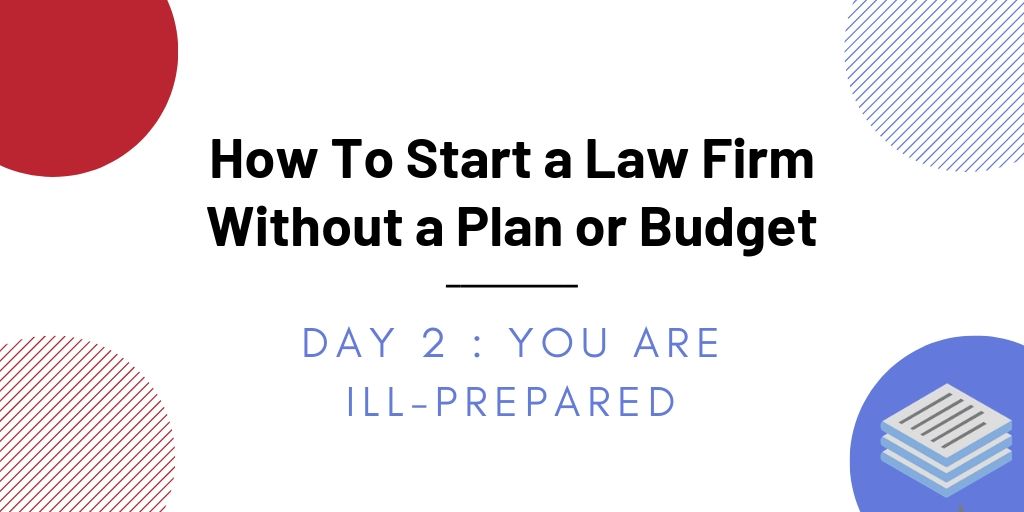
I told you yesterday that you are especially qualified to build a law firm, that you are incredibly smart and that you can do this. I 100% believe that.
But today, let’s start with a reality check:
Wherever you went to law school, your professors prepared you well to be an awesome lawyer. But they likely didn’t do much to prepare you to own a law firm. How could that be?
The first problem is that law schools don’t know what they do. The New York Times hosted a fantastic conversation about this problem in their Room for Debate feature back in 2011. I suggest you read it.
The comment that most fascinated me came from Professor Kevin Noble Maillard of Syracuse University: “Law school is not a trade school.”
Ignoring for a second the question of whether a law school should be a trade school — Is it moral to charge that much for a program that won’t even try to train you to earn it back? — we can at least acknowledge that law schools don’t see themselves trade schools. Very few law programs make any effort to show you how to succeed as a practicing lawyer.
But law school got me ready for a bar exam prep course which got me ready for the bar exam which got me a law license. So I’m good, right?
Wrong. You can’t assume that a law license will lead to success. You own a business. You’re not just a practitioner, you own a practice.
That distinction comes from the book The E-Myth Revisited by Michael Gerber. The myth of the entrepreneur is that being a good practitioner means you’ll be a good practice-owner. That couldn’t be further from the truth.
Thinking and acting like a business-owner means more risk, more creativity, and more Hail Mary passes than lawyers are accustomed to. But that’s your reality, and you need a reality check.
The need to think differently has never driven the legal market like it has over the last decade, not to mention the next. Legal innovation is more than just a buzzword. Thinking like an owner may prove an existential requirement.
So, forget law school. Don’t blame your professors or your career services office or your clinical advisors.
The real reason you’re not prepared for the current legal market? It has never existed before.,,
When I hired any employee I asked them to write down what gaps they have in their experience and training against what the job description asks for. No hire will ever check all the boxes on your job description. The goal is to create a process for filling those gaps.
That’s no less true for you.
Do you feel you lack substantive knowledge in a practice area you like? Do you lack technology skills? Do you lack management or marketing experience?
Imagine everything a firm owner does (and certainly ask a mentor to help you flesh this out) and write up a job description. Then identify where you face the highest hurdles. Knowing these challenges will help you design a plan to overcome them.

(This is similar to David C Baker’s “Getting to Know” process that we talked about here. Just add skills you feel you lack as a business owner as well.)
Don’t flail mindlessly against your challenges; write them down. That’s how you overcome them. We’ll talk more about how another day. For today, just put the gaps to paper. Name and own them.
You have a virtual address, now you need a real one.
Finding an office is easily the most personal decision of your first 14 days. A domain name and phone number won’t change your life, but setting yourself up in an environment that keeps you unproductive will break you down. Especially if you do a really dumb thing and get into a long-term lease (yes, I did that).
My advice: call around to attorneys who practice in an area that interests you and ask if they have a room you can use. Or a corner. A tiny corner with a tiny desk and space enough for a tiny laptop. And a conference room.
The office helps, but being around another attorney will shape how you work. If you become office buddies with a jerk, you’ll know what not to do; if you’re spending your days down the hall from a ninja, knowledge will trickle down. Rent a room and get an education. It’s a good deal.
The best way to do this is to take as many lawyers to lunch as you can in your first weeks and let them know that you’re looking for space. I promise they’ll know somebody. Or you’ll be asked to office with someone you just spent a lunch with—another fine result.
If a tight budget constrains you, go to the local UPS store and ask for a P.O. box. They have a service that will give you an actual address with a suite number, rather than a P.O. box number.
I worked out of a virtual office for my first two years of practice. I paid $30 a month for the address and by the hour for the conference room. That worked okay, but my family life made that arrangement tough. A lawyer with four kids at home probably needs an office.
Your personal situation will define this decision. And it should. The choice should not focus on price, but on productivity. How will you generate the best results for your clients? Do that.
Whatever you resolve to do, do it today. If you don’t have a better solution by the end of the day, just go with the UPS option and keep looking. You need an address for things like court-appointment lists and malpractice insurance, so get one. You can always change it later.
(Coming Soon) Go on to the next chapter: The Path to Mastery
Or, go back to the Table of Contents
Rapidly draft common legal letters and emails.
How this skill works
Specify the recipient, topic, and tone of the correspondence you want.
CoCounsel will produce a draft.
Chat back and forth with CoCounsel to edit the draft.
Get answers to your research questions, with explanations and supporting sources.
How this skill works
Enter a question or issue, along with relevant facts such as jurisdiction, area of law, etc.
CoCounsel will retrieve relevant legal resources and provide an answer with explanation and supporting sources.
Behind the scenes, Conduct Research generates multiple queries using keyword search, terms and connectors, boolean, and Parallel Search to identify the on-point case law, statutes, and regulations, reads and analyzes the search results, and outputs a summary of its findings (i.e. an answer to the question), along with the supporting sources and applicable excerpts.
Get answers to your research questions, with explanations and supporting sources.
How this skill works
Enter a question or issue, along with relevant facts such as jurisdiction, area of law, etc.
CoCounsel will retrieve relevant legal resources and provide an answer with explanation and supporting sources.
Behind the scenes, Conduct Research generates multiple queries using keyword search, terms and connectors, boolean, and Parallel Search to identify the on-point case law, statutes, and regulations, reads and analyzes the search results, and outputs a summary of its findings (i.e. an answer to the question), along with the supporting sources and applicable excerpts.
Get a thorough deposition outline in no time, just by describing the deponent and what’s at issue.
How this skill works
Describe the deponent and what’s at issue in the case, and CoCounsel identifies multiple highly relevant topics to address in the deposition and drafts questions for each topic.
Refine topics by including specific areas of interest and get a thorough deposition outline.
Ask questions of contracts that are analyzed in a line-by-line review
How this skill works
Allows the user to upload a set of contracts and a set of questions
This skill will provide an answer to those questions for each contract, or, if the question is not relevant to the contract, provide that information as well
Upload up to 10 contracts at once
Ask up to 10 questions of each contract
Relevant results will hyperlink to identified passages in the corresponding contract
Get a list of all parts of a set of contracts that don’t comply with a set of policies.
How this skill works
Upload a set of contracts and then describe a policy or set of policies that the contracts should comply with, e.g. "contracts must contain a right to injunctive relief, not merely the right to seek injunctive relief."
CoCounsel will review your contracts and identify any contractual clauses relevant to the policy or policies you specified.
If there is any conflict between a contractual clause and a policy you described, CoCounsel will recommend a revised clause that complies with the relevant policy. It will also identify the risks presented by a clause that does not conform to the policy you described.
Get an overview of any document in straightforward, everyday language.
How this skill works
Upload a document–e.g. a legal memorandum, judicial opinion, or contract.
CoCounsel will summarize the document using everyday terminology.
Find all instances of relevant information in a database of documents.
How this skill works
Select a database and describe what you're looking for in detail, such as templates and precedents to use as a starting point for drafting documents, or specific clauses and provisions you'd like to include in new documents you're working on.
CoCounsel identifies and delivers every instance of what you're searching for, citing sources in the database for each instance.
Behind the scenes, CoCounsel generates multiple queries using keyword search, terms and connectors, boolean, and Parallel Search to identifiy the on-point passages from every document in the database, reads and analyzes the search results, and outputs a summary of its findings (i.e. an answer to the question), citing applicable excerpts in specific documents.
Get a list of all parts of a set of contracts that don’t comply with a set of policies.
Ask questions of contracts that are analyzed in a line-by-line review
Get a thorough deposition outline by describing the deponent and what’s at issue.
Get answers to your research questions, with explanations and supporting sources.